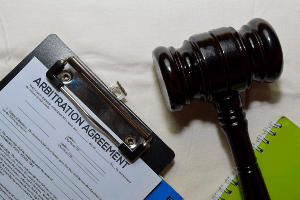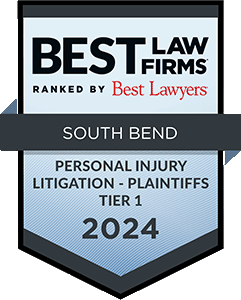 Going to court is an expensive and time-consuming way to attempt to resolve a car accident claim. You are also leaving the case in the hands of a jury, which could make a decision that is unfavorable to the victim.
Going to court is an expensive and time-consuming way to attempt to resolve a car accident claim. You are also leaving the case in the hands of a jury, which could make a decision that is unfavorable to the victim.
Fortunately, there are alternative dispute resolutions, two of which are mediation and arbitration. Below, we discuss arbitration of car accident claims, so you can learn how it works and the pros and cons of this process.
Our car accident lawyers in South Bend are committed to pursuing full compensation for your damages and working to secure a favorable resolution as quickly as possible. If we validate your claim and you hire our firm, we are prepared to manage every step of the process, including arbitration if it becomes a viable option for your claim.
Call today to schedule a free legal consultation.
What is Arbitration?
Arbitration is a legal proceeding in which both parties involved in a legal claim present their side of the case to a third party called an arbitrator. The arbitrator then reviews the evidence, questions both parties about the case and presents a resolution to both parties. In a personal injury case, an arbitrator is looking to answer a few questions:
- Who is at fault for the accident?
- Did the victim suffer an injury?
- How severe is the injury?
- Should the victim receive compensation?
- How much should the victim recover in compensation?
Arbitrators are neutral parties and have no interest in the outcome of the claim one way or another. Arbitrators are often retired judges or lawyers with experience in this type of case. Both parties must agree on the arbitrator before the process can begin.
Arbitration is different from mediation because the arbitrator determines the outcome of the case. In mediation, the parties involved attempt to come up with a resolution.
Binding vs. Non-Binding Arbitration
Arbitration is usually legally binding, which means the decision made by the arbitrator is final. That means you cannot appeal it, such as by filing a lawsuit.
If arbitration is non-binding, the decision can be appealed. However, those involved in an injury claim usually do not agree to non-binding arbitration. You would be taking a risk that you would be wasting your time. If one side does not like the outcome, they can simply appeal it. Non-binding arbitration also adds to the cost of the legal process.
Arbitration may be mandated by the insurance company, or it may be mandated by the court if a lawsuit has been filed. However, even if arbitration is not mandated, your attorney may consider it.
It is important to hire an experienced lawyer who has handled a variety of cases and has experience with alternative dispute resolutions.
The Process of Arbitration
Arbitration is sort of like a trial, but it is much less formal. For example, both sides can make opening statements, like you would in a trial.
The next step in the process is presenting evidence. For example, both sides testify under oath. They can also present physical evidence, like medical records, medical bills, documentation of lost wages and more.
However, there are no technical rules of evidence at arbitration like there are at a trial. You can present things like medical records without needing to bring in an expert to present them. You do not need to call coworkers or others from your job to be witnesses to discuss your lost income. You can just present documentation of lost income.
Your attorney may want to call witnesses, such as those who witnessed the crash, along with family members who can explain how your injuries have affected you.
After you present your case, the defense presents its case. You have the option of cross-examining their witnesses, just as they can with your witnesses.
Once all the evidence has been presented, both sides have an opportunity to make closing arguments. This is a chance to review the evidence that was presented, why it was presented and the result you are looking for.
Arbitrators often need time to review the evidence before deciding how to resolve the case. Typically, a written decision will come within a few days of the arbitration hearing.
What are the Pros and Cons of Arbitration?
There are good and bad things about arbitration, just as there are good and bad things about going to court or negotiating a settlement.
Pros of Arbitration
Here are some benefits of arbitration:
- It costs much less than going to trial, which could drag on for quite a while
- It is much less formal than a trial, often happening in a conference room, which means less waiting around
- Relaxed rules of evidence, meaning evidence that might not be admissible in court can be considered
- You can work with the other party to agree on an arbitrator and other aspects of the process
- There may be greater predictability in the outcome because the arbitrator will likely understand the law and how to evaluate a case
- You can make a high-low agreement, which sets a range of damages before the proceeding starts, so you know you are at least going to get some compensation
Cons of Arbitration
These are some of the disadvantages of arbitration:
- It is usually binding so there is no way to appeal the decision, unlike a jury verdict or judge’s decision
- The arbitrator may undervalue your claim by a significant amount
- A jury may award more compensation than an arbitrator
Contact Us Today to Discuss Your Accident
Have questions about recovering compensation for your damages?
Our attorneys have secured millions in compensation, including numerous settlements for motor vehicle crash victims. For decades, we have been helping accident victims in Indiana secure the compensation they need to move forward.
Our services come with no upfront fees, and you are not obligated to hire our firm after meeting with us to discuss what happened.
We are here to help and there is no financial risk to you. Call (844) 678-1800.











